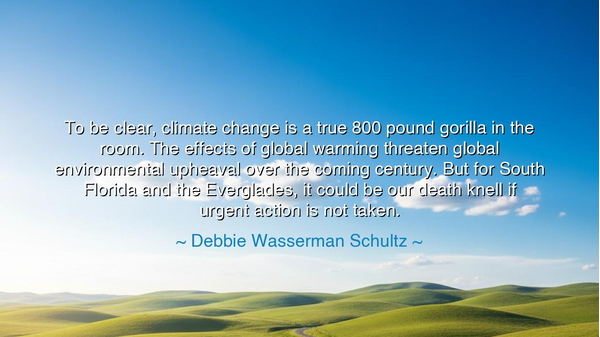
To be clear, climate change is a true 800 pound gorilla in the
To be clear, climate change is a true 800 pound gorilla in the room. The effects of global warming threaten global environmental upheaval over the coming century. But for South Florida and the Everglades, it could be our death knell if urgent action is not taken.






Hear the warning struck like a gong in humid air: “To be clear, climate change is a true 800 pound gorilla in the room. The effects of global warming threaten global environmental upheaval over the coming century. But for South Florida and the Everglades, it could be our death knell if urgent action is not taken.” In these words, Debbie Wasserman Schultz names both the vastness of the peril and the intimacy of its aim. The world trembles, yes—but here, in this low and shining peninsula, the sea leans against the door. The image of the 800 pound gorilla is not a jest; it is a reminder that power unacknowledged still takes up all the space, still breathes down our necks, still decides the hour unless we stand and meet its gaze.
Consider the phrase global environmental upheaval. It is not a storm in a single town, but a re-sculpting of coastlines, seasons, and species. Yet the proverb of peril is local: salt fingers creep into wells; king tides crown the streets; mangroves march inland seeking higher ground. The Everglades, that slow, grassy river whose sheet of water once quilted an empire of wading birds and sawgrass, becomes a narrowing corridor, pinched by canals from the north and by brine from the south. Here the planetary and the provincial clasp hands: what we call global warming writes its signature in neighborhood puddles and in the hush of vanished herons.
Mark a story the elders now tell the young. Not so long ago, a “sunny day” brought sea to doorways in Miami’s low places; engines failed in brackish crossings; fish glittered in parking lots as if confused by maps. The newspapers called it a nuisance. The old ones, who remembered when freshwater flowed as softly as a prayer from the lake to the bay, shook their heads: nuisance is a gnat; this is a tightening fate. The South Florida grid faltered under heat; insurers reeled; oaks that had known a century fell to roots loosened by salt. None of this was myth; it was the accounting ledger of a coast being slowly repossessed.
To understand the Everglades is to understand why this warning carries a priestly gravity. The sawgrass plain is a lung; it breathes water in sheets rather than gulps, filtering, cooling, feeding aquifers, cushioning storms. Break the lung, and the city downstream coughs. Pave a vein here, straighten a river there, hold back a lake with arrogance, and the patient weakens. Add the fever of climate change—higher seas, crueler droughts—then pour salt into the wound. The ledger turns red: panthers crowded onto islands of habitat, manatees hungry where seagrass thins, wading birds missing in numbers that once darkened the sky.
Some will say: the century is long; the 800 pound gorilla moves slowly. But the wise do not bargain with mass and momentum. A tide that rises by inches can claim a house; a degree of heat can unwrite a forest; a decade of delay can make urgent action into merely adequate mourning. The phrase death knell is harsh because it must be: bells are cast to be heard above laughter and trade. A knell tells the village, “Stop and count.” Count the acres saved and the acres lost; count the dollars of prevention against the fortunes of repair; count the children and ask what shoreline will greet their weddings.
Yet despair is a poor architect. The lesson of this oracle is resolve braided to craft. We must bind restoration to resilience: send more freshwater south on a natural timetable; breach the old levees that strangle flow; raise roads and rails on pilings where they cross the river of grass; stitch mangroves and marshes as living seawalls; design neighborhoods with room for water to wander without wrecking; electrify, insulate, and shade until demand curves soften like dusk. Make policy the spine and habit the muscle; let budgets speak the truth our speeches claim.
Carry these actions like tools at dawn: (1) Back urgent action that accelerates Everglades restoration—land acquisitions, reservoir and stormwater treatment areas that mimic the old sheet flow. (2) Defend aquifers—curb overpumping, seal canals where salt tongues invade, price water to honor its scarcity. (3) Cut heat at the root—commit to clean energy, efficient buildings, cool roofs and trees enough to lower city fevers. (4) Build with retreat in mind—zoning that respects flood maps, buyouts that are dignified, insurance that reflects risk and drives safer siting. (5) Make nature your co-engineer—oyster reefs, mangroves, and marshes that blunt waves and birth fish. (6) Teach the story yearly—so South Florida remembers that the Everglades is not scenery but system, not backdrop but bloodstream. Do this faithfully, and the bell that tolled a death knell can become a reveille—summoning a people to their posts until the 800 pound gorilla is met not with denial but with design, and the room is ours again.






AAdministratorAdministrator
Welcome, honored guests. Please leave a comment, we will respond soon